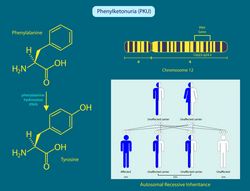Phenylketonuria in adulthood
The introduction of newborn screening tests and a phenylalanine-free diet has prevented severe neurological damage and disabilities in patients suffering from PKU. However, the PKU diet is restrictive, unpleasant and often psychologically and socially difficult to follow. As a result, many patients decide to stop dietary management. Although the phenylalanine levels during childhood are known to impact cognition, there is no evidence on the consequence of high phenylalanine levels in adults. Since the first cohort of early-treated PKU patients has now reached adulthood, it is possible to relate adult levels of phenylalanine with neurological function and cognition. This was the scope of the EU-funded TREPAPHEN(opens in new window) (Early treated patients with PKU: Exploring the association between measures of metabolic control, cognitive performance and neurological health) project. Researchers studied the neurophysiological function of 42 PKU patients with matching controls. They tested their language skills in terms of spelling, reading, and comprehension, as well as their attention, visuo-motor coordination, memory and learning. Apart from physical tests, participants filled in mental, dietary and physical health questionnaires. Overall, no general cognitive disability was observed in adult PKU patients, but, instead, a pattern of strengths (accuracy in language) and weaknesses (slower speed of processing, planning and monitoring difficulties). Patient performance in a number of cognitive domains as well as physical health was modulated by adult phenylalanine levels, underscoring the importance of keeping a strict diet even in adulthood. Although PKU patients presented no mental health difficulties, an emotional disturbance was associated with diet maintenance. Policies across European Health Services regarding diet maintenance throughout life in PKU patients have been controversial. The information obtained during the TREPAPHEN study illustrates for the first time the importance of following a strict PKU diet in adulthood but often at an emotional cost. The TREPAPHEN results will help towards establishing best practices that enhance the well-being of PKU patients and reduce medical and societal costs.







